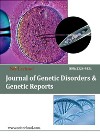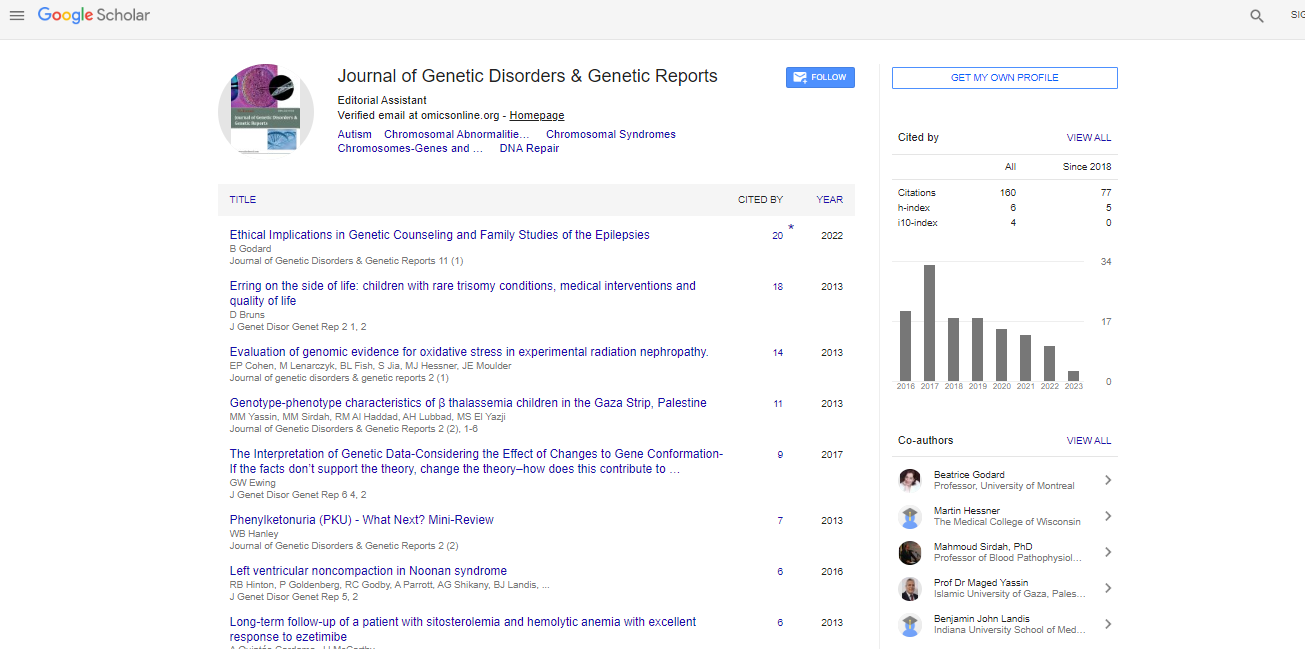About the Journal

Journal of Genetic Disorders and Genetic Reports is a peer-reviewed scholarly journal and aims to publish the most complete and reliable source of information on the discoveries and current developments in the mode of original articles, review articles, case reports, short communications, etc. in all areas of genetics, Medical Genetics and making them available online freely without any restrictions or any other subscriptions to researchers worldwide.
Submit manuscripts at Online Submission System or send as an e-mail attachment to the Editorial Office at manuscript@scitechnol.com
Journal of Genetic Disorders and Genetic Reports focuses mainly on topics that include:
- Mutations & Functional Consequences
- Chromosomes, Genes and DNA variations
- Environmental genetics
- Population Genetics and Evolution
- Multifactorial and polygenic (complex) disorders
- Chromosomal Abnormalities: Incidence & Types
- Genetic Counseling & Education
- Chromosomal Syndromes
- Errors in DNA Repair
- Genetic Disorders & Therapeutic Interventions
- Bioinformatics
The journal uses Editorial Tracking System for quality in review process. Online Submission System is a mode of online manuscript submission, review and tracking system. Review processing is performed by the editorial board members of Journal of Genetic Disorders and Genetic Reports or outside experts; at least two independent reviewer’s approval followed by editor approval is required for acceptance of any citable manuscript. Authors may submit manuscripts and track their progress through the system. Reviewers can download manuscripts and submit their opinions to the editor. Editors can manage the whole submission/review/revise/publish process.
Genetic Disorders
A genetic disorder is a genetic problem caused by one or more abnormalities in the genome, especially a condition that is present from birth.
Molecular Genetics
Molecular genetics is the field of biology and genetics that studies the structure and function of genes at a molecular level.
Down syndrome
Down syndrome is a genetic disorder caused by the presence of all or part of a third copy of chromosome. It is typically associated with physical growth delays, characteristic facial features, and mild to moderate intellectual disability.
Gene Therapy
Gene therapy is a therapeutic delivery of nucleic acid polymer into a patient’s cell as a drug to treat disease. Gene therapy could be a way to fix a genetic problem at its source.
Genetic Medicine
Medicine that involves the diagnosis and management of hereditary disorders. It is the study of genetic mechanisms, including the genetic basis of human disease, and the development of genetically based tests and therapies.
Personal Genomics
It is the branch of genomics concerned with the sequencing and analysis of the genome of an individual and then giving them their genomic information.
Genetic Brain Disorders
A genetic brain disorder is caused by a variation or a mutation in a gene. A variation is a different form of a gene. Genetic brain disorders specifically affect the development and function of the brain.
Autism
Autism is neurodevelopmental disorder characterized by impaired social interaction, verbal and non-verbal communication, and restricted and repetitive behavior. It is a birth defect and it is treatable.
Statistical Genetics
Statistical genetics is a scientific field concerned with the development and application of statistical methods for drawing inferences from genetic data. It is most commonly used in the context of human genetics.
Medical Genetics
Medical genetics is the specialty of medicine that involves the diagnosis and management of hereditary disorders. Medical genetics differs from human genetics.
Genetic Epidemiology
Genetic Epidemiology is the study of the role of genetic factors in determining the health and disease in families and in populations, and interplay of such genetic factors with environmental factors.
Mutations & Functional Consequences
A mutation occurs when a DNA gene is damaged or changed in such a way as to alter the genetic message carried by that gene.
Chromosomes, Genes and DNA variations
Genetic variation refers to differences between members of the same species or those of different species. Genetic variation also refers to diversity in gene frequencies related to heredity of individuals.
Environmental Genetics
Gene-environment correlations can arise by both casual and non-casual mechanisms. Genetic variants influence environmental exposure indirectly via behavior.
Population Genetics and Evolution
It is a field of biology that studies genetic composition of biological population and the changes in the genetic composition that result from the operation of various factors, including natural selection.
Multifactorial and polygenic (complex) disorders
Multifactorial disorders involve variations in multiple genes, often coupled with environmental causes. Polygenic disorder caused by the combined action of more than one gene.
Chromosomal Abnormalities: Incidence & Types
Chromosome abnormality is a missing, extra or irregular portion of chromosomal DNA. There are many types. However, they can be organized into two basic groups. Those are Numerical and structural abnormalities.
Genetic Counseling & Education
Genetic counseling is a communication process, which aims to help individuals, couples and families understand and adapt to the medical, psychological, familial, and reproductive implications of the genetic contributions to specific health conditions.
Chromosomal Syndromes
A syndrome is a set of medical signs and symptoms that are correlated with each other and, often, with a specific disease. General designation for syndromes due to chromosomal aberrations; typically associated with mental retardation and multiple congenital anomalies.
DNA Repair
DNA repair is collection of process by which a cell identifies and corrects damage to the DNA molecules that encode its genome.
Fast Editorial Execution and Review Process (FEE-Review Process):
Journal of Genetic Disorders & Genetic Reports is participating in the Fast Editorial Execution and Review Process (FEE-Review Process) with an additional prepayment of $99 apart from the regular article processing fee. Fast Editorial Execution and Review Process is a special service for the article that enables it to get a faster response in the pre-review stage from the handling editor as well as a review from the reviewer. An author can get a faster response of pre-review maximum in 3 days since submission, and a review process by the reviewer maximum in 5 days, followed by revision/publication in 2 days. If the article gets notified for revision by the handling editor, then it will take another 5 days for external review by the previous reviewer or alternative reviewer.
Acceptance of manuscripts is driven entirely by handling editorial team considerations and independent peer-review, ensuring the highest standards are maintained no matter the route to regular peer-reviewed publication or a fast editorial review process. The handling editor and the article contributor are responsible for adhering to scientific standards. The article FEE-Review process of $99 will not be refunded even if the article is rejected or withdrawn for publication.
The corresponding author or institution/organization is responsible for making the manuscript FEE-Review Process payment. The additional FEE-Review Process payment covers the fast review processing and quick editorial decisions, and regular article publication covers the preparation in various formats for online publication, securing full-text inclusion in a number of permanent archives like HTML, XML, and PDF, and feeding to different indexing agencies.
 Spanish
Spanish  Chinese
Chinese  Russian
Russian  German
German  French
French  Japanese
Japanese  Portuguese
Portuguese  Hindi
Hindi 








